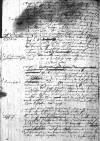Wir haben nicht wenig wolgef(a)lens gehabt aws E(wer) E(rbarkei)t negst cf. [Georg SCHEWECKE?] to Ioannes DANTISCUS 1542-04-01 — 1542-04-20, CIDTC IDL 6853, letter lost⌊schreiben(n)cf. [Georg SCHEWECKE?] to Ioannes DANTISCUS 1542-04-01 — 1542-04-20, CIDTC IDL 6853, letter lost⌋, / das uns ein hidden by binding⌈[in]in hidden by binding⌉ erbar(r), ernfest, unser lieb(e)r Georg von Höfen (Georg Flachsbinder, Georgius de Curiis) (†after 1550-02-07), Ioannes Dantiscus' brother; Starosta of Rössel (HARTMANN 1525-1550, No. 584, 586, 588; AGAD, MK, 77, f. 385-386v)⌊bruderGeorg von Höfen (Georg Flachsbinder, Georgius de Curiis) (†after 1550-02-07), Ioannes Dantiscus' brother; Starosta of Rössel (HARTMANN 1525-1550, No. 584, 586, 588; AGAD, MK, 77, f. 385-386v)⌋ und heuptman zu Rössel (Reszel), town in Ermland (Warmia), 55 km NE of Allenstein (Olsztyn), on the border with Ducal Prussia⌊Rossel hidden by binding⌈[ossel]ossel hidden by binding⌉Rössel (Reszel), town in Ermland (Warmia), 55 km NE of Allenstein (Olsztyn), on the border with Ducal Prussia⌋ hot, mit anczeigen on the margin⌈anczeigenanczeigen on the margin⌉ viler woltath im von E(wer) E(rbarkei)t bewisen, / hot uber hidden by binding⌈[er]er hidden by binding⌉antwurt, / nemlich in dem, / das E(wer) E(rbarkei)t mit irer lieben hidden by binding⌈[ieben]ieben hidden by binding⌉ probably Katarina Schewecken (Katarina Mandt), wife of Georg Schewecke, daughter of Gdańsk Mayor Georg Mandt (ZDRENKA 2, p. 275)⌊hausfrawen(n)probably Katarina Schewecken (Katarina Mandt), wife of Georg Schewecke, daughter of Gdańsk Mayor Georg Mandt (ZDRENKA 2, p. 275)⌋ zu gutter gesuntheit wider komen, die Got zu langen geczeitn(n) wolle bestetigen(n), / [...] hidden by binding⌈[...][...] hidden by binding⌉ der wir ouch E(wer) E(rbarkei)t / von wegen viler freuntlich[...] hidden by binding⌈[...][...] hidden by binding⌉ zwischen uns erwachssen uff zu kumfftiger tagfart zu Marienburg on the margin⌈uff zu kumfftiger Provincial Diet of Royal Prussia ⌊tagfartProvincial Diet of Royal Prussia ⌋ zu Marienburg (Malbork), town and castle in northern Poland, Pomeranian Voivodeship, on the Nogat river, a branch of the Vistula at its delta, the capital of the Grand Masters of the Teutonic Order in Prussia (1309-1457), a voivodeship capital in Royal Prussia, which belonged to the Kingdom of Poland (1466-1772). Marienburg (taking turns with Graudenz (Grudziądz)) was the venue for the Provincial Diets of Royal Prussia, which were chaired by the bishop of Ermland (Warmia)⌊MarienburgMarienburg (Malbork), town and castle in northern Poland, Pomeranian Voivodeship, on the Nogat river, a branch of the Vistula at its delta, the capital of the Grand Masters of the Teutonic Order in Prussia (1309-1457), a voivodeship capital in Royal Prussia, which belonged to the Kingdom of Poland (1466-1772). Marienburg (taking turns with Graudenz (Grudziądz)) was the venue for the Provincial Diets of Royal Prussia, which were chaired by the bishop of Ermland (Warmia)⌋uff zu kumfftiger tagfart zu Marienburg on the margin⌉ gern(n) wollten(n) sehen u[...] hidden by binding⌈[...][...] hidden by binding⌉ und freuntlich anreden(n) und bitten, / so es sich beg superinscribed in place of crossed-out ges[...]⌈ges[...] hidden by binding⌈[...][...] hidden by binding⌉ sich beg[...] hidden by binding⌈[...][...] hidden by binding⌉ sich beg superinscribed in place of crossed-out ges[...]⌉, das E(wer) E(rbarkei)t do hin ... illegible⌈...... illegible⌉, wie wir uns vorhoffen, / do [...] hidden by binding⌈[...][...] hidden by binding⌉ kueme, / wolde sich zu unserm(m) slechten haustische hidden by binding⌈[he]he hidden by binding⌉ zu komen(n) nicht besveren(n), / do mit wir zceitli[...] hidden by binding⌈[...][...] hidden by binding⌉ unsere alte kuntschafft und freuntschafft mocht(en) er hidden by binding⌈[er]er hidden by binding⌉newen(n). / Welchs uns E(wer) Er(barkei)t, / wie wir uns ge[...] hidden by binding⌈[...][...] hidden by binding⌉lich zu Ewer Erbarkeit, die wir gotlichnn gnad befelnn on the margin in place of crossed-out der⌈der E(wer) E(rbarkei)t, die wir gotlichn(n) gnad befeln(n) Ewer Erbarkeit, die wir gotlichnn gnad befelnn on the margin in place of crossed-out der⌉, wollen(n) versehen(n), / nicht wirt vorsag(en).

 AAWO, AB, D. 7, f. 9v (t.p.)
AAWO, AB, D. 7, f. 9v (t.p.)